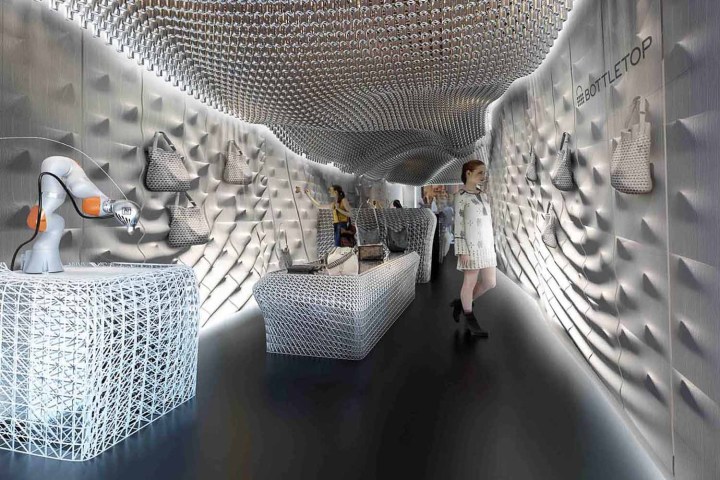
A new project by 3D-printing company Ai Build and luxury fashion brand Bottletop has recently launched in London, where the brand’s flagship brick and mortar store was finished using robotic fabrication and recycled materials. The interior of the 3D-printed store was created using filament from Reflow, an “ink” provider whose filament is entirely upcycled from plastic waste. The project serves as an example for how construction and fashion can combine in sustainable ways, without turning their backs on beautiful design.
“What is so special about 3D printing is that it opens up the possibility to control precisely where every single drop of material will be placed to form a physical object,” Daghan Cam, Ai Build’s co-founder and CEO, told Digital Trends. “That basically means that the material is deposited only where it needs to be, [in contrast] to conventional subtractive manufacturing methods which can be extremely wasteful.”
Ai Build has made waves in the past with its construction of sophisticated structures, meticulously built using Kuka robots and machine vision algorithms. Last year, the London-based startup revealed its “Daedalus Pavilion” at a conference in Amsterdam. The 350-pound structure consisted of 48 individual parts, yet took a surprisingly brief fifteen days to print.
Now Cam and his team have taken their penchant for design to the fashion industry by partnering with Bottletop, a fashion company that crafts their goods out of upcycled materials — yes, including bottletops — instilling sustainable values into a traditionally unsustainable industry.
“Fashion and construction industries are two of the biggest contributors of environmental pollution today,” Cam said. “This project demonstrates how cutting-edge technology can become the solution for such a fundamental problem of humanity as the environmental pollution.”
To be sure, the Bottletop store wasn’t completely 3D printed, like the proposed office space in Dubai, but by using recycled materials the project manages to make an impact in its own right.
“By turning waste plastic from India and Africa into a luxurious construction with our partners, we are questioning the status quo,” Cam added. “We believe that supporting the circular economy and zero-waste design philosophy through projects like this is the key for achieving a sustainable future of our built environment.”


